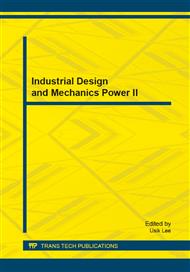p.728
p.734
p.740
p.744
p.748
p.752
p.761
p.765
p.769
Application of Mixed-Integer Programming and Dispatching Rules on Parallel Machine Scheduling with Inserted Idle Time
Abstract:
This research considers the problem of scheduling jobs on unrelated parallel machines with inserted idle times to minimize the earliness and tardiness. The aims at investigating how particular objective value can be improved by allowing machine idle time and how quality solutions can be more effectively obtained. Two mixed-integer programming formulations combining with three dispatching rules are developed to solve such scheduling problems. They can easy provide the optimal solution to problem involving about nine jobs and four machines. From the results of experiments, it is found that: (1) the inserted idle times decreases objective values more effectively; (2) three dispatching rules are very competitive in terms of efficiency and quality of solutions.
Info:
Periodical:
Pages:
748-751
DOI:
Citation:
Online since:
October 2013
Authors:
Price:
Сopyright:
© 2013 Trans Tech Publications Ltd. All Rights Reserved
Share:
Citation:


